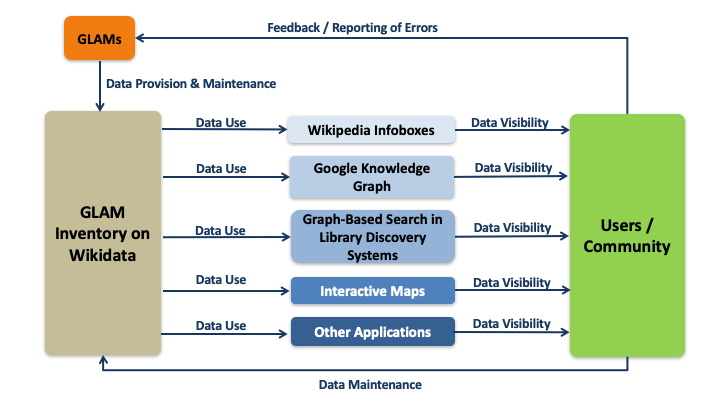Sum of all Swiss GLAMs aims to improve the information about heritage institutions on Wikidata and to promote the use of this information on Wikipedia and in other projects. The goal is to achieve a complete and high-quality inventory of heritage institutions and make this information available on an international level. The main aim of Sum of All Swiss GLAMs is to get Swiss heritage institutions and their umbrella organizations to actively participate in data maintenance on Wikidata alongside volunteer contributors. A Wikiproject page has been set up here: https://www.wikidata.org/wiki/Wikidata:WikiProject_Wiki_Loves_GLAMs.
Background and Context
Sum of all Swiss GLAMs is a spin-off of the project “Sum of all GLAMs”, carried through by Wiki Movimento Brazil in 2019 in collaboration with OpenGLAM CH. The Brazilian project, which was kindly supported by the MY-D Foundation, focussed on the creation of templates enabling the automated use of data from Wikidata in Wikipedia (infobox and M-Babel templates in different languages). In parallel, the project “Sum of all Swiss GLAMs” analysed the current state of data quality, data modelling and data completeness related to Swiss GLAMs on Wikidata. A case report on the state of January 2020 can be downloaded here as a pdf.
Project Goals & Strategies
The Sum of all Swiss GLAMs Onboarding Project focuses on two aspects: data provision and maintenance through a crowdsourcing approach; and promotion of actual data use to encourage data provision in the first place.
Data Provision and Maintenance
The project will sensitize heritage institutions to the usefulness of Wikidata in the pursuit of their own mission. Currently, the use of Wikidata differs strongly from one institution type to the other. Some archives and libraries already make use of Wikidata to give their holdings greater visibility, namely by referencing relevant holdings of their institutions by means of the property “archives at”. Other institutions, such as the ETH Library and Swissbib, are developing their collection discovery systems with the help of Wikidata to enhance the users’ search experience. Nevertheless, the number of Swiss institutions making use of Wikidata is still rather low, in the museum community in particular.
The project will encourage Swiss heritage institutions to check, correct and complement their data entries on Wikidata. Thereby, the focus will lie on providing information not only about the institutions themselves (first level of description), but also about the institutions’ holdings (second level of description).
As many institutions do not have any editing experience and some may not even know about the existence of Wikidata, the main challenge of this sensitization campaign is to engage the GLAMs in something completely new. To give a large number of institutions a first insight in Wikidata, to show the possibilities which it offers and to explain how to edit and query the database, free introductory courses and online tutorials will be provided that are particularly targeted at GLAMs. The courses and tutorials will be promoted through the various OpenGLAM CH communication channels (website, newsletter, mailing lists, Facebook, Twitter) and through the communication channels of the professional umbrella associations VSA, Bibliosuisse and VMS / ICOM Switzerland.
Promotion of Data Use
In order to incentivize GLAMs to regularly update the information on Wikidata, it is important to show and promote the use of the data in a variety of applications.
Some institutions already use Wikidata as a means to give their holdings greater visibility on Wikipedia or to improve their own collection discovery systems. One of the goals of the Sum of all Swiss GLAMs Onboarding Project is to familiarize a greater number of institutions with the opportunities offered by Wikidata as a central data repository that powers a variety of applications, including Wikipedia infoboxes, Google searches, graph-based searches in library discovery systems, Wikidata-powered maps used for a variety of campaigns, etc.
By promoting its use, the project ensures that the data gets more visibility, which in turn encourages active data maintenance – not only by the institutions themselves, but also by the members of the Wikimedia community. As indicated in figure 1 below, greater data use thus promotes better data quality. And better data quality will enhance the benefits for the users of the various applications.
Feedback loops between data use and data quality:

Results
The final report on this project can be found here:
Follow-up project
After this project was completed in March 2022, a follow-up project was launched, running from April through September 2022, with the goal of consolidating the previous work and complementing the set of tutorials. The remainder of the year is reserved for the planning of the ensuing project phase and securing funding. It coincides with a longer absence of the project manager due to a civil service assignment.
he project consisted of three work packages:
- WP 1 – Project Management
- WP 2 – Workshops / Tutorials / Website
- WP 3 – Communication Campaign
The project was carried out by the following team members:
- Gaston Wey was appointed as project manager in June 2022. He was responsible for project management (WP 1), for tutorial production and the workshops and the maintenance of the website (WP 2), as well as the communication campaign (WP 3).
- Andrea Allemann initially acted as project manager before handing over the task to Gaston in June. Her activities focused on consolidating project outputs from the preceding phase and on ensuring a smooth handover to the new project manager before leaving the project in August.
Tutorials
The second work package included the creation of tutorials and their integration on the website, https://tutorials.schoolofdata.ch/. This work had already been initiated in the preceding project phase. However, many tutorials had not yet been translated and integrated into the website.
The goal of this work package was to translate all the existing German tutorials into English, and a portion of the tutorials into French. All the completed tutorials were uploaded to the website and to YouTube. In addition, several new tutorials were created.
Work continued on the website https://tutorials.schoolofdata.ch during the course of the current project phase. The website had some shortcomings that had already been identified in the previous project phase. In the course of the current phase, all tutorials marked as finished were uploaded to the website. Also, tutorials that were incorrect or unfinished were removed from the website. The website is now in a better condition, as the tutorials have been properly classified and the corresponding YouTube video has been added to each completed tutorial. As a result, each tutorial appears in a compact package. Each appears with a description, a YouTube video, and the PowerPoint to download.
The tutorials were also uploaded to YouTube on our channel hcohgeladen. The videos can be found here. If you like the videos, please leave a like and subscribe to our channel. If you have any feedback on the videos, please feel free to contact Gaston Wey.
Results
The complete results of the continuing Onboarding Project can be found here:
Contact
Please contact Gaston Wey if you would like to
- know more about the Sum of All GLAMs project.
- contribute to the project and be part of the working group.
- host a workshop at your institution.
- publish your institution’s data on Wikidata.
- financially support the project.



